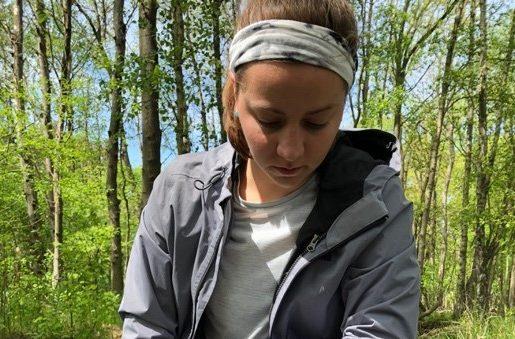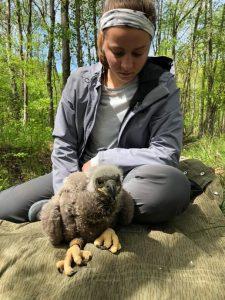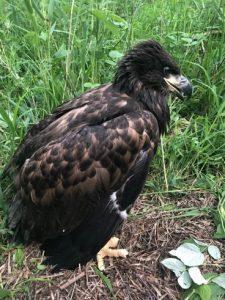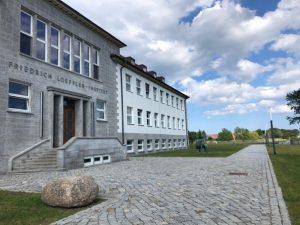-
About
- Leadership & Faculty
- News & Events
-
Academics
- Graduate
- Advanced Clinical Training
- Continuing Education
- Academic Departments
- Academic Offices
- Simulation Experiences
-
Student Life
- Offices
-
Research
-
Hospitals & Clinics
- Emergency Care
- Hospital Services
-
Community Outreach
- Volunteer
Field and Lab Techniques: Germany Edition
Kristen Bishop, MCM’19 Summer Externship with the Leibniz Institute for Zoo and Wildlife Research (IZW) in Berlin

This summer, I had the ultimate pleasure of spending five and a half weeks in Germany to complete my externship for the Master’s in Conservation Medicine (MCM) program at Tufts University. While in Deutschland, I assisted with fieldwork, which included ringing (banding) and sampling nestling white-tailed sea eagles (WTSE) with the Leibniz Institute for Zoo and Wildlife Research (IZW) in Berlin. In addition, I assisted with lab work for a project monitoring avian influenza at the Friedrich-Loeffler Institute (FLI) on the island of Reims.
White-tailed Sea Eagles and Avian Influenza
The white-tailed sea eagle (Haliaeetus albicilla), a relative of the bald eagle, is a highly protected raptor species whose range spans from southern Europe to Russia. Currently, their biggest threats are anthropogenic, including train collisions and lead poisoning. In 2016 and 2017, an outbreak of highly pathogenic avian influenza (HPAI) subtype H5N8 caused a major die-off of wild and domestic birds in Germany, including the first documented infections and deaths of WTSE. Most of the birds that succumbed to the virus were juveniles, leading us to wonder if adult birds had the capability of building up resistance to HPAI. To determine if the eagles have antibodies against avian influenza, we assayed blood samples collected during fieldwork using an influenza A ELISA (enzyme-linked immunosorbent assay) kit. This can determine if the chicks receive maternal antibodies from their mothers. In addition, adult blood samples from other projects will be analyzed for influenza A antibodies.
Part 1: Field Techniques:
The first part of my externship was assisting Dr. Oliver Krone and his team at IZW with routine ringing (banding) and sampling of nestling WTSE. To do this, we had to travel between 1.5 and 3 hours to the northeastern part of the country, specifically in Mecklenburg-Western Pomerania and the island of Usedom. Once we found the nests, we used a drone to look for eggs or chicks in the nest, and estimated the age of any chicks present. If the chicks were too young, the bands would not fit their legs, and if they were too old the chicks may attempt to fly out of the nest. If there were eggs and/or chicks of proper age, a climber would ascend the tree and lower the chicks or eggs down in a canvas bag. On the ground, Dr. Krone and I would gather measurements from the chicks to assess the age and sex of the bird, band the chicks with two metal ID tags around their legs, and collect blood for further analyses. Afterwards, the confused chick was returned to the nest safe and sound. Like with all fieldwork, some days were more successful than others, but I got to help ring and sample around 20 chicks, and I loved every minute of it! It was hard work, but it was definitely worth every bug bite and scratch.
A few tips for fieldwork prep/expectations:
-Be prepared for the weather! When doing fieldwork, you are at the complete mercy of mother nature. Be sure to check the forecast before you leave so that you have rain gear, sunscreen, or whatever you may need to survive!
-BRING BUGSPRAY!! I made the mistake of assuming that wearing long sleeves and pants will protect you from insect bites. I was wrong. Don’t be like me (and get over 100 bites on your back alone…).
-Be open-minded and flexible! It’s hard to predict what’s going to happen each day. Some days were very productive, and others had things like empty nests or bad weather. You have to learn to roll with the punches and enjoy the successes as they come, because those days will make all of your sacrifices worth it!
-Enjoy nature! Yes, being outside in the humidity and/or rain made me miss the indoors and air conditioning, but mostly I loved spending hours in the forest away from technology and taking in all of the nature around me.
Step 2: Lab Techniques
After four weeks at IZW, I traveled by train to FLI, which is located on an island along Germany’s Baltic Coast. There I met Dr. Anja Globig, and learned about their many research projects (from African swine fever and Ebola to rabies and avian influenza), and helped start the research collaboration with IZW. Unfortunately, a delay in the shipping of the WTSE samples prevented me from doing the actual testing for the project, but I got to assist with taking blood from the sentinel mallards at FLI and running an ELISA test using their serum and egg yolks to detect influenza A virus antibodies. This trip was a nice change of pace from the bustling city of Berlin, and I learned a lot about a really cool institute.
A few tips for overall externship success:
-Be prepared for anything: Not everything that you do is going to go as planned. For example, I lost one of my only working debit cards the second day of my externship. Thankfully, I was prepared and brought copies of everything so I could get a new one shipped to me.
-Explore! Obviously, this depends on where you go and your comfort level, but make sure to make the most out of your trip. I regret spending time in my Airbnb room being afraid of getting lost/not understanding people (I don’t speak German). By the end I explored as much as possible, but I missed out at the beginning.
-Don’t be afraid to ask for help! You have a lot of support, both at Tufts and wherever you decide to go for your externship. Your mentors are there to help you, so don’t feel bad asking for directions, recommendations, or any questions!


